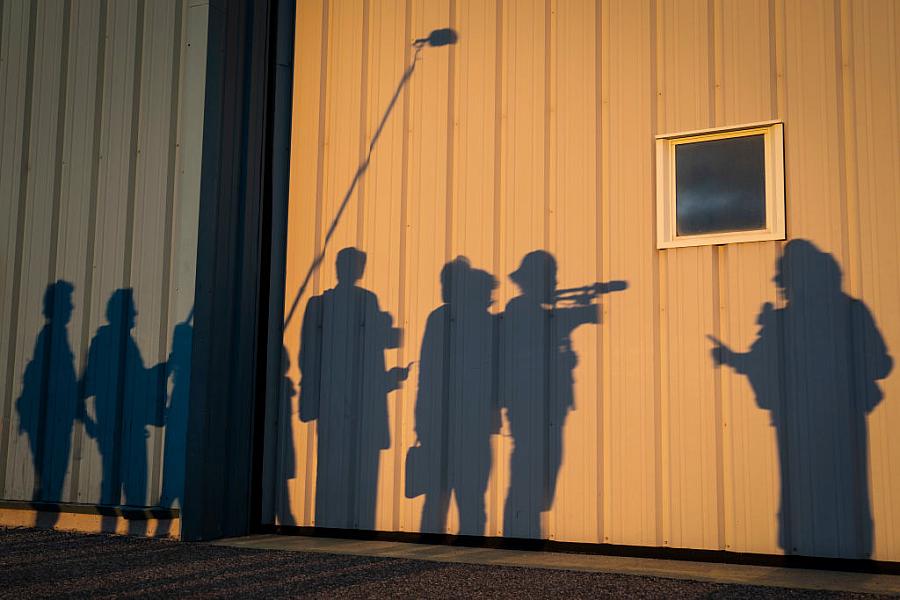This election season has been a brutal grind for journalists, our community told us

Members of the media watch as the plane of then-candidate Donald Trump departs Manchester-Boston Regional Airport.
(Photo by Jabin Botsford/The Washington Post via Getty Images)
This election season has put a strain on almost everyone, but it’s posed unique challenges for journalists tasked with covering the glut of news while seeking to maintain a semblance of well-being.
The sheer volume of stories and tip sheets on how to cope with election stress — prune your social media, savor the changing leaves, prioritize your physical health — made clear the sense of collective strain. For journalists, the situation has been made worse by the barrage of insults and threats emanating from the winning candidate — 108 in the final eight weeks of the campaign alone, according to Reporters Without Borders.
We asked those in our community how they were faring with their workload and coping with the stress of the moment.
“Longer work days resulting in less time to decompress and even sleep,” Caitlin Schmidt, editor and publisher at Tucson Spotlight, wrote of her experience. How is she coping? “Not well — I'm just working through it and have told myself I'll regroup when I can.”
More than 70% of those who responded to our short survey said they endured a marked increase in stress in recent weeks and months as a result of their reporting duties.
“I was recently asked to cover Kamala’s Medicare plan and detail it in one article with a lens toward caregivers,” health journalist Amanda Krupa wrote just before the election. “Combing through all of this information in a short time is stressful and ultimately if she isn’t elected it will all be for nothing.”
“There was a lot to report on,” wrote Ben Trefny, executive producer at public radio station KALW in San Francisco. “I compartmentalize my feelings (for better or for worse), so I have not felt so emotional because of the work itself. But a lot of my colleagues feel traumatized, even though they're stepping up to work very hard, and that has made me want to try to make more space to share feelings in the workplace.”
Several journalists pointed to a sense of exhaustion and frustration in trying to counter the waves of misinformation this election season.
KALW’s emergency and disaster reporter, Wren Ferrell, lamented the outsize influence of such misinformation campaigns and the policies they portend. He added: “I feel terrified by the right-wing policies being enacted on the local, state, and federal levels. They will have very real consequences for myself and my loved ones.”
On election day, Mary Ann Koruth, a reporter for The Bergen Record in New Jersey, wrote: “Personally, this has been stressful; I feel I am trying to educate friends and others about the misinformation going out from one campaign, and I’m failing. I feel stressed about Trump's divisive messaging, and how it might affect faith in the fourth estate.”
Krupa added: “I got really stressed when I heard Trump wants to appoint Robert Kennedy Jr. to lead health initiatives. As a journalist and a parent, it would be an infiltration of misinformation threatening the health of all.”
Ed Kashi, a veteran photojournalist, concurred with the general sense of stress and fatigue among journalists who replied to our survey. “I'm coping by reducing media intake and not reading deep into stories which leave me feeling hopeless,” he wrote.
What might help in this moment? One respondent suggested additional newsroom staff could help alleviate some of the burnout. Others pointed to the value of mental health days, therapy, meditation, and trusted colleagues to talk through it all.
Krupa was already looking to the work to come — reporting on the big policy shifts under a Trump administration. Whoever ends up winning, Krupa would welcome “resources detailing specific changes to policies proposed and the process and timeline for them,” she said.
That’s a suggestion we’ll certainly be taking to heart at the Center. Keep an eye on our newsletter for events and programs to come that aim to provide just those kinds of practical resources.
We already have a webinar planned for journalists seeking to make sense of Trump’s evolving health policy agenda. We hope you can join us. Click here to sign up for the program on Nov. 21.
